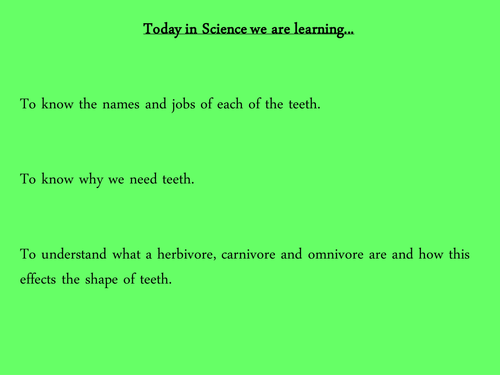397Uploads
1754k+Views
2403k+Downloads
Biology

Animal Skulls - TEETH - Carnivore & Herbivore
PowerPoint with 12 different animal skulls: students to decide if the animal was a herbivore, carnivore or omnivore by looking closely at the animals teeth.
Includes lesson objectives
*To know the names and jobs of each of the teeth.
*To know why we need teeth.
*To understand what a herbivore, carnivore and omnivore are and how this effects the shape of teeth.
with some small group work activities.
Exciting introductory activity.
Please rate and comment if you use it. Enjoy!
Sale

Food Chains
Food Chains - paper chains.
7 different food chains to be made into paper chains:
The Sun - Decayed plants - Worms -Birds - Eagles
The Sun - Algae - Mosquito Larvae - Dragonfly Larvae - Fish - Raccoon
The Sun - Dandelions - Snail - Frog - Bird - Fox
The Sun - Grass - Cow - Humans
The Sun - Leaves - Caterpillars - Birds - Snakes
The Sun - Decayed plant - Worm - Bird - Eagle
The Sun - Grass - Grasshopper - Frog - Snake - Eagle
Sale

Photosynthesis Reading Comprehension
This resource includes a double-sided, KS3 introductory text ‘Photosynthesis: Earth’s Vital Process’ and 13 supporting worksheets.
The well-researched text explores Earth’s unique habitability, processes sustaining life, and the pivotal role of photosynthesis. It examines the evolution of plants from ocean to land, plants’ diverse structures and functions. The text also details photosynthesis - the components involved, the importance of leaves, stems and roots. It discusses the broader impacts like food chains, energy transfer, and the interconnectedness of life, emphasizing plants’ vital role in producing food and oxygen.
Supporting worksheets include:
Double sided multiple-choice quiz with 32 questions
3 levels of written response sheets
2 cloze summary sheets
True/False with 42 questions
4 differentiated crosswords using key vocabulary
2 word searches
Answer sheets included
Sale

Animal Classification Sorting Research
Engaging, hands-on animal kingdom activities for exploring and classifying 14 animal groups: Amphibians, Annelids, Arachnids, Birds, Cnidarians, Crustaceans, Echinoderms, Fish, Myriapods, Mammals, Molluscs, Porifera, Reptiles, Insects.
Includes:
Differentiated A5 fact cards (2 levels - primary and KS3 ) - perfect for a classroom scavenger hunt research activity
85 illustrated animal sorting cards
Vertebrate/invertebrate, warm blooded/cold blooded, animal groups sorting headings
47 double-sided vocabulary flashcards perfect for Quiz-Quiz-Trade (2 levels)
65 double-sided animal and animal group QQT cards
Research collection sheets
Crosswords
Posters
Suitable for years 3 through to year 8, this comprehensive resource features carefully researched information and detailed illustrations to introduce key animal facts. Sorting activities, flashcards, and research materials provide differentiated and engaging ways for students to explore creature classifications.
Bundle Sale

Living Things, Animal Classification Bundle
Engaging activities for early primary students to explore living and nonliving things using MRS GREN. Includes images, games, presentations, and vocabulary for building science knowledge.
Also covers animal kingdom classification for upper primary/KS3 . Compares 14 animal groups with facts, sorting cards, flashcards, and research materials.
This science bundle encourages hands-on interaction across two key topics. Students will love the visuals and cooperatives for grasping living/nonliving differences and creature characteristics!
Bundle Sale

Habitats
Habitat fact files!
7 double sided non-chronological reports about 7 different habitats & 7 habitat cloze exercises.
Cloze exercises are shortened versions of the non-chronological reports and are differentiated two ways: great to use together.
Also includes a food chain paper chain activity.






